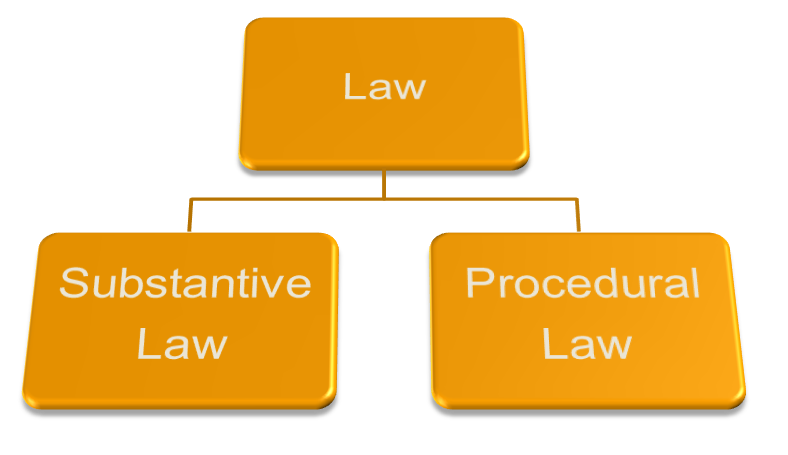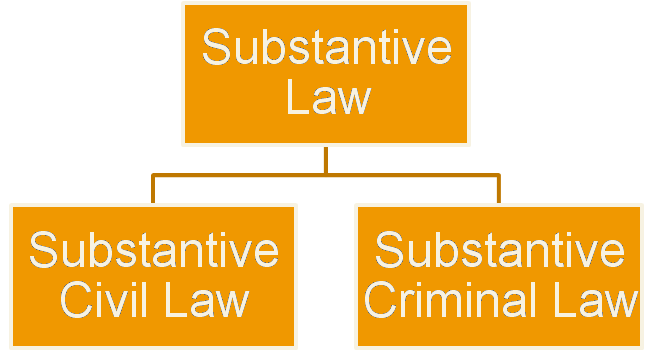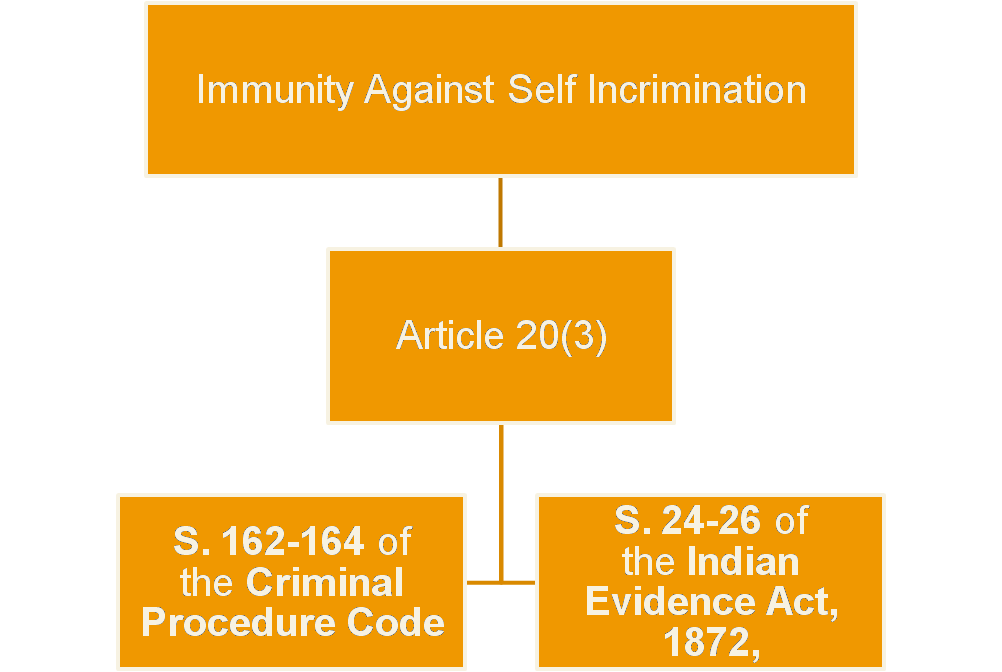Branches Of Law

Origin
The Substantive and Procedural Laws are the two important branches of Law. The terms “Substantive” and “Procedural” seem to have been invented by Bentham in 1843.
Bentham has propounded that the ‘SUBSTANTIVE Law’ and ‘Procedural Law’ can be clearly and sharply separated. He has stated that “By procedure, is meant the course taken for the execution of the laws …. Laws prescribing, the course of procedure have on a former occasion been characterized by the term Adjective Laws.
This is in contradiction to those other laws, the execution of which they have in view, and which for this same purpose have been characterized by the correspondent opposite term, Substantive Laws”.
Substantive Law
Simple Definition – Creating rights and obligations (liabilities) on persons.
The Substantive Laws are basically derived from Common, Statutory, Constitution and from the Principles found in judicial decisions following the legal precedents to cases with similar facts and situations. With the passage of time and creation of new Statutes, the volume of Substantive Law has increased. For Example:- Penal Law, Law of Contract, Law of Property, Specific Relief Act, etc are Substantive Law.
Substantive Law deals with the legal relationship between subjects (individuals) or the subject and the State. Substantive Law is a Statutory Law that defines and determines the rights and obligations of the citizens to be protected by law; defines the crime or wrong and also their remedies; determines the facts that constitute a wrong -i.e. the subject-matter of litigation in the context of administration of justice. The Substantive Law, defines the ‘remedy’ and the right; includes all categories of Public and Private Law and also includes both Substantive Civil and Criminal Law
- Substantive Civil Law
The Civil Law includes any private wrong, a ‘Tort’, which unfairly causes someone else to suffer loss or harm resulting in legal liability for the person who commits the tortious act. Substantive Law defines to charge the ‘Tort’. Sustentative Civil Law also includes the Law of Contract- defines what is essential elements required for formation of contract; real property. The Indian Succession Act, 1925 deals with Substantive Law of testamentary succession in regard to persons other than Muslims and intestate succession in regard to persons other than Hindu and Muslims in India. Other Acts that provides for Substantive Civil Law in India are Indian Contract Act, 1872; Transfer of Property Act 1882; Specific Relief Act; Indian Trust Act, 1882.
- Substantive Criminal Law
The Indian Penal Code (IPC) in India defines various penal offences and lists the elements that must be proved to convict a person of a crime. It also provides for punishment applicable to these offences. For example Substantive Criminal Law defines what constitutes ‘Murder’, ‘Robbery’, ‘Rape’, ‘Assault’ etc.
Procedural Law
Procedural Law (or Adjective Law) deals with the enforcement of law that is guided and regulated by the practice, procedure and machinery. This law is very important in administration of justice. Procedural law functions as the means by which society implements its substantive goals. Procedural law is derived from constitutional law, Statutes enacted by legislature, law enforcement agencies promulgating written regulations for their employees, which may not have the force of law but their violation may result in internal sanctions; and the rules and procedural guidelines laid down by the Supreme Court.
It comprises of
(i) jurisdiction (in the conflicts sense);
(ii) jurisdiction (domestic sense) ;
(iii) the action, including summons, pleadings, trial(including evidence);
(iv) judgment;
(v) appeal;
(vi) execution.
Procedural Law is that law which prescribes method of enforcing rights or obtaining redress for their invasion; machinery for carrying on a Suit.
The Code of Civil Procedure, 1908;
Code of Criminal Procedure, 1973;
Indian Evidence Act, 1872;
Limitation Act, 1963;
The Court Fees Act 1870;
The Suits Valuation Act, 1887
are examples of Procedural Law in India.
Procedural law is derived from constitutional law ???

Comparison between Substantive Law and Procedural Law
| Substantive law | Procedural Law |
| 1. The Substantive law defines and determines the obligations and rights of people and legal entities.
2. When a particular law defines rights or crimes or any status, it is called Substantive Law. It defines how a crime or tort will be charged and how the evidence and case facts will be presented and handled. 3. A Substantive Law also provides for Prohibitions administered by courts which behaviors are to be allowed and which are prohibited- such as law providing prohibition against murder or the sale of narcotics. |
1. Procedural law lays down the method of aiding, the steps and procedures for enforcement of Law- Civil and Criminal.
2. The laws that determine how the rights of the plaintiff and defendant will be protected and enforced throughout the course of the case Procedural Laws. It includes procedure, pleading, and evidence. Ex: The right to a speedy trial for a person accused of ‘manslaughter’ is procedural 3. Procedural Laws provides rules to determine, how the Substantive Laws are to be administered, enforced, changed, and used in the mediation of disputes -such as filing charges or presenting evidence in court. |
General Rule for Applicability
The general rule for applicability of procedural laws is that it would be applicable retrospectively whereas substantive laws are applicable prospectively, unless otherwise provided. Adjudication of proceedings before a court/ forum in the usual circumstances is not a matter of substantive right of a litigant. However, amendments particularly dealing with change of forum which affect pending proceedings before a court/ forum do not remain merely procedural as they affect the vested substantive right of a litigant and are an exception to the general rule of retrospective application of procedural laws. Therefore, such amendments dealing with change of forum with respect to pending proceedings cannot be applied retrospectively unless there is a specific provision in the amendment to that effect.
The word retrospective signifies looking back at, thus retrospective effect of law means giving effect to the amendment in the existing law before the date in which the changes/amendment was brought in.
Article 20 of the Constitution of India prohibits the legislature to make retrospective criminal laws, however, it does not prohibit a civil liability retrospectively i.e. with effect from a past date. Therefore, tax can be levied retrospectively. However, in tax law, if there is a penal provision, retrospectively is not permitted to that extent.
Landmark Case – Hitendra Vishnu Thakur v. State of Maharashtra [(1994) 4 SCC 602; AIR 1994








No comment